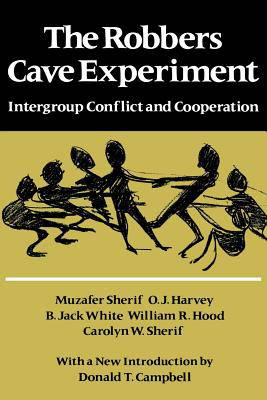
- Retrait gratuit dans votre magasin Club
- 7.000.000 titres dans notre catalogue
- Payer en toute sécurité
- Toujours un magasin près de chez vous
- Retrait gratuit dans votre magasin Club
- 7.000.0000 titres dans notre catalogue
- Payer en toute sécurité
- Toujours un magasin près de chez vous
The Robbers Cave Experiment
Intergroup Conflict and Cooperation. [Orig. Pub. as Intergroup Conflict and Group Relations]
Muzafer Sherif, O J Harvey, B Jack White
Livre broché | Anglais
33,95 €
+ 67 points
Description
The Robbers Cave Experiment is a classic of behavioral science. Originally issued in 1954 and updated in 1961 and 1987, this pioneering study of "small group" conflict and cooperation has long been out-of-print. It is now available, in cloth and paper, with a new introduction by Donald Campbell, and a new postscript by O.J. Harvey. In this famous experiment, one of the earliest in inter-group relationships, two dozen twelve-year-old boys in summer camp were formed into two groups, the Rattlers and the Eagles, and induced first to become militantly ethnocentric, then intensely cooperative. Friction and stereotyping were stimulated by a tug-of-war, by frustrations perceived to be caused by the "out" group, and by separation from the others. Harmony was stimulated by close contact between previously hostile groups and by the introduction of goals that neither group could meet alone. The experiment demonstrated that conflict and enmity between groups can be transformed into cooperation and vice versa and that circumstances, goals, and external manipulation can alter behavior. Some have seen the findings of the experiment as having implications for reduction of hostility among racial and ethnic groups and among nations, while recognizing the difficulty of control of larger groups. "This is the best and most complete of Sherif's great experimental studies in intergroup conflict. None of the experimental research in this area that has followed it has approached it in magnitude, time of involvement of the participants, or general completeness in invoking identities in intergroup conflict." -Donald Campbell "[The Robbers Cave Experiment] has, in my opinion, achieved the status of a classical investigation in experimental social psychology. . . . [It] represents a valuable contribution to our knowledge in the very complicated field of intergroup relations." -Otto Klineberg "Magnificently conceived and brilliantly carried forward from beginning to end. . . . I do not believe that anyone can escape from the impact of the demonstration." -Gardner Murphy "Unusual for its effective combination of experimental method in a real life situation with the successful test of important hypotheses." -Ralph H. Turner
Spécifications
Parties prenantes
- Auteur(s) :
- Editeur:
Contenu
- Nombre de pages :
- 264
- Langue:
- Anglais
Caractéristiques
- EAN:
- 9780819561947
- Date de parution :
- 01-02-88
- Format:
- Livre broché
- Format numérique:
- Trade paperback (VS)
- Dimensions :
- 152 mm x 229 mm
- Poids :
- 390 g

Les avis
Nous publions uniquement les avis qui respectent les conditions requises. Consultez nos conditions pour les avis.






